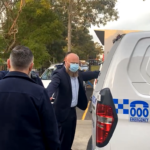I Live in An Affected Local Government Area: Can I Leave it to Work?

We felt great pity for Melbournians last year when the ‘ring of steel’ was assembled around the metropolitan area, with various police checkpoints to ensure that people were only leaving or entering for ‘authorised’ reasons under the state’s public health order.
Well, now it’s Sydney’s turn.
The Sydney ‘ring of steel’ has been in place since 12am on Saturday 17 July 2021 and will remain effective until at least 30 July 2021.
It affects residents in Greater Sydney and it’s surrounds, including Blue Mountains, Central Coast, Wollongong and Shellharbour.
Ring inside a ring
During outbreaks of COVID, authorities have encouraged residents of Greater Sydney to work from home, wherever possible.
But that changed on 17 July 2021, with the State Government introducing harsher new restrictions throughout the region.
The strictest rules, though, apply to the Local Government Areas (LGAs) of Fairfield, Canterbury-Bankstown and Liverpool, where authorities say the outbreak is the worst.
Exempted workers
The Government first announced that only essential health and emergency workers could leave these LGAs for work.
However, it has since released a revised list of those permitted leave to these areas to attend work.
These ‘exempted affected workers’, or ‘authorised workers’, are:
| Sector | Exempted affected person (authorised worker) |
| Retail trade | A person employed or engaged to work for a retail premises specified in clause 24(1A) of the Order:
|
| Retail trade | industrial or commercial food retailing |
| Administrative and support services | “click and collect” services |
| Public administration and safety | a member of the NSW Police Force, Fire and Rescue NSW, the NSW State Emergency Service, the NSW Rural Fire Service or the
Ambulance Service of NSW or other emergency services worker |
| Public administration and safety | the administration of justice, including in relation to the operation of courts and tribunals, correctional centres and community corrections.
The Bar Association of New South Wales has advised that this includes lawyers who are leaving their LGA to attend court, provided the appearance cannot be undertaken by a remote method such as telephone, email or audio-visual link. |
| Public administration and safety | a person employed or engaged by or on behalf of the NSW Government for the purposes of responding to the COVID-19 pandemic |
| Public administration and safety |
|
| Public administration and safety | Defence, national security and law enforcement |
| Public administration and safety |
|
| Health care and social assistance | a person who provides health services within the meaning of the Health Services Act 1997 (whether or not in the public or private sector) or a registered health practitioner or a person who works for a registered health practitioner |
| Health care and social assistance | a person employed or engaged by the Department of Communities and Justice to provide housing or homelessness services |
| Health care and social assistance | a person employed or engaged to provide services to persons with disability or vulnerable persons |
| Health care and social assistance | a person employed or engaged at a residential aged care facility |
| Health care and social assistance | family violence and sexual assault services |
| Health care and social assistance | veterinary services (including laboratory and diagnostic services and clinics) |
| Health care and social assistance | animal welfare, care and accommodation services (excluding pet grooming unless there is an immediate animal welfare reason) |
| Health care and social assistance | end of life services including funeral, crematorium and cemetery services, mortuaries and morgues, spiritual or religious services connected to end of life services |
| Education | education and schooling |
| Education | early childhood education and care |
| Agriculture | biosecurity and food safety personnel undertaking critical duties |
| Manufacturing | production and manufacturing of food, beverages, groceries and sanitary products |
| Manufacturing | food and fibre processing and manufacturing |
| Manufacturing | manufacture of food and beverage packaging |
| Manufacturing | manufacture of coffins and caskets |
| Manufacturing | manufacturing of medical equipment, consumables and personal protective equipment |
| Manufacturing | manufacturing of telecommunications equipment and infrastructure |
| Transport, postal and warehousing | seaport and airport operations |
| Transport, postal and warehousing | freight, logistics, postal, courier or delivery services (including food logistics, delivery and grocery fulfilment) |
| Transport, postal and warehousing | export supply chain operators |
| Transport, postal and warehousing | distribution of food, groceries and sanitary products for sale by supermarkets, grocery shops or other shops that predominantly sell food or drinks |
| Transport, postal and warehousing | warehousing |
| Transport, postal and warehousing |
|
| Electricity, gas, water and waste services |
|
| Information media and telecommunications |
|
| Other services | essential services for the maintenance, safety and upkeep of public and recreational spaces
|
Fines for businesses
There are $10,000 fines for employers who force their employees to attend work where it is possible for them to work from home.
The new restrictions come and businesses are feeling particularly fragile on the back of the 2019 bushfires and foods, and last year’s pandemic restrictions. People too, are feeling the strain of uncertainty, and in some cases, a sense of cynicism that the tough sanctions being placed on personal freedoms to save the health system could end up costing the economy greatly for years to come.
The New South Wales Government has put the current restrictions in place until July 30, but has already warned that the lockdown could last even longer if case numbers don’t subside. If more suburbs become ‘COVID hotspots’ there is also the possibility that restrictions could be widened to include other areas.
Know the rules, or risk tough penalties
And it’s important to know the rules. New South Wales Police have increased their presence in LGAs where people’s movement is restricted and have the authority to issue on-the-spot fines.
At the beginning of Sydney’s lockdown 3 weeks ago, the police stated that they would take an ‘enforcement approach’ to the public health orders, which basically means that they won’t be generous with handing out warnings.
- You can be fined $1,000 if you don’t follow public health orders.
- You can be fined a further $5,500 for each day that you don’t follow the orders.
- You can be fined $200 for not wearing a face mask.
While you can challenge the fine in court, courts across New South Wales are currently dealing with a pandemic-related backlog, so this could be a long and drawn out process.
It is also important to be aware that those who are sent to court by police for alleged COVID breaches, or who elect to have their cases determined in court, face a fine of up to $11,000 and/or 6 months imprisonment if they are found to have committed the offence of failing to comply with a public health order.







